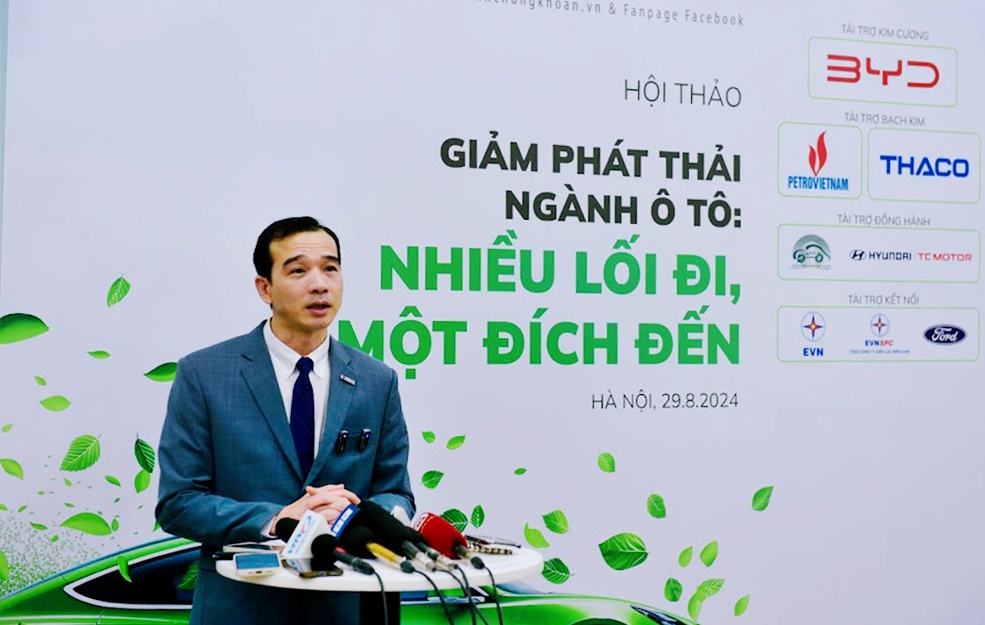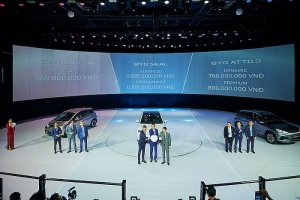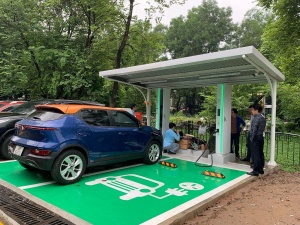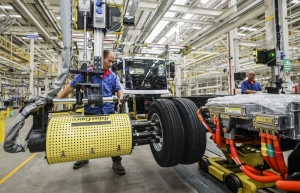BYD commits to convenient offerings for vehicle owners
Vietnam’s government has already committed to net-zero emissions by 2050, and transport emissions are one of the main troubles in this process. How do you assess the potential of the green vehicle market in Vietnam?
 |
| Vo Minh Luc, CEO of BYD Vietnam |
Vietnam’s golden population ratio is excellent, the economic growth rate is high, and highway infrastructure is being funded and expanded quickly. These are all great aspects for the electric vehicle (EV) industry and new energy vehicles in general.
Moreover, the car ownership rate in Vietnam is currently very low compared to neighbouring countries such as Thailand or Indonesia, while the number of motorbikes is considerable at about three million units, which may switch to cars. That means the opportunity to develop the car market and green cars in particular is huge.
In addition, it is easier to access to car loans from banks. With only VND200 million ($8,330), consumers can buy a car with low interest rates and loan terms of up to eight years. In addition, Vietnam’s transport infrastructure, especially the highway system, is developing rapidly.
Policies to encourage and support the development of EVs and the investment of new energy vehicle manufacturers are contributing to building up the market. I believe that with favourable factors in infrastructure, policies, and increasing demand, the green car market in Vietnam will develop rapidly.
BYD cars are getting popular in Vietnam. What business plans are ahead for BYD in this country?
BYD aims for a comprehensive green transportation strategy, which is clearly demonstrated by its presence in 11 different transportation sectors such as cars, buses, trucks, delivery vehicles, specialised vehicles for construction, and more. BYD can convert all petrol or diesel vehicles into pure EVs.
For the automobile industry, BYD owns four brands (BYD, Denza, Fangchengbao, and Yangwang). Each brand has its own features for customers to choose a new energy vehicle model that matches with their needs. In 2022, BYD stopped manufacturing internal combustion engine vehicles to focus on new energy vehicles.
Regarding BYD’s business plan in this market, we have just launched the brand in Vietnam. BYD is building a network system and team for the entire dealer system. EVs are still quite new products to many users and the distribution system. Therefore, BYD prioritises developing the dealer network.
Up to date, BYD has 36 dealers, with 16 of them put into operation, and 20 dealers under construction. We aim to expand to 50 dealers in 2024, 70 dealers in 2025, and 100 dealers in 2026.
In addition, BYD will introduce three new EV models in Vietnam and work hard with partners to develop charging station network nationwide to rapidly promote investment in related infrastructure.
What challenges are there in terms of expansion of charging stations?
We face many challenges, especially related to available land and other legal issues. Most EV brands prioritise large city markets, but there is not much land, and it is extremely difficult to find land slots for charging stations.
The second problem is in apartment buildings, where the population density is very high. Installing charging stations here is almost impossible due to many barriers in space and infrastructure. We have been studying some technical solutions for apartment residents to access charging stations more easily in the future.
In addition, the procedures and processes related to investing in charging stations are still unclear and complicated. Currently, regulations on charging stations have not been specified, causing difficulties for investors. For example, fire prevention and power connection issues are very complicated, and we will have to spend a lot of effort and time to overcome them.
Will BYD provide any supporting policy for partners to build charging stations, and can you recommend how the government can develop charging infrastructure for greener cars?
BYD’s strategy does not directly invest in charging stations, and this is our global orientation. Instead, BYD focuses on its core strengths, like technological innovation, research and development of advanced products to contribute to environmental protection, and improving the quality of life for people. Numerous other businesses are also interested in charging station investment.
If the government provides more incentives and investment attraction policies such as exemptions from corporate income tax and other taxes for a few years, or helps us with land issues, it will become much easier to build charging stations.
However, investing in charging stations is a mandatory requirement for BYD. Each dealer must have at least two fast-charging stations, with a capacity of 120 KW, that an EV can be fully charged within 20 minutes for travelling around 400-500km.
We are working with more than 10 partners to develop a nationwide charging station network, and this is gradually expanding to cover more areas. In addition, BYD also provides and installs free home chargers for customers.
An EV can run about 400km after a full charging at a cost of about $8, enough for a week. EVs can benefit from cost savings and environmental protection, and BYD is making every effort to bring the most convenient experience to users.
 | BYD targets openning 100 dealerships in Vietnam within next three years Chinese electric vehicle giant BYD intends to open 100 dealerships in Vietnam within the next three years as part of its aggressive expansion efforts in the country. |
 | PV Power invests over $70,000 to build electric vehicle charging station in Hanoi Petrovietnam Power Corporation (PV Power) is building a pilot electric vehicle (EV) charging station in Hanoi, marking its entry into Vietnam's fledging EV charging station market. |
 | Chinese EV giant BYD posts 24.4 per cent rise in profit Leading Chinese automaker BYD posted on Wednesday a 24.4 percent rise in net profit for the first half of 2024, boosted by continuing strong demand for electric cars in its home and overseas markets. |
What the stars mean:
★ Poor ★ ★ Promising ★★★ Good ★★★★ Very good ★★★★★ Exceptional
 Tag:
Tag:
Related Contents
Latest News
More News
- Ho Chi Minh City launches plan for innovation and digital transformation (February 25, 2026 | 09:00)
- Vietnam sets ambitious dairy growth targets (February 24, 2026 | 18:00)
- Masan Consumer names new deputy CEO to drive foods and beverages growth (February 23, 2026 | 20:52)
- Myriad risks ahead, but ones Vietnam can confront (February 20, 2026 | 15:02)
- Vietnam making the leap into AI and semiconductors (February 20, 2026 | 09:37)
- Funding must be activated for semiconductor success (February 20, 2026 | 09:20)
- Resilience as new benchmark for smarter infrastructure (February 19, 2026 | 20:35)
- A golden time to shine within ASEAN (February 19, 2026 | 20:22)
- Vietnam’s pivotal year for advancing sustainability (February 19, 2026 | 08:44)
- Strengthening the core role of industry and trade (February 19, 2026 | 08:35)






















 Mobile Version
Mobile Version